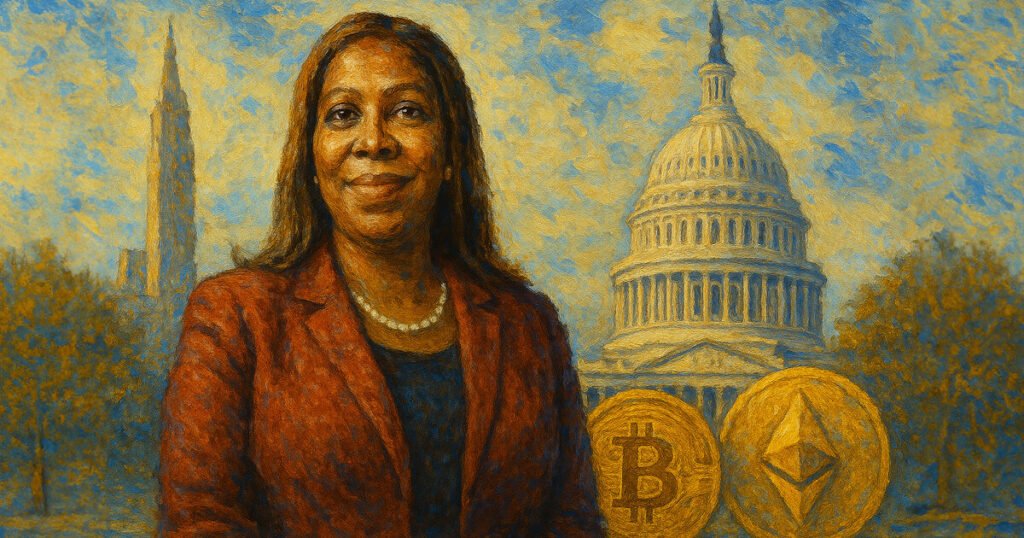Title: New York Attorney General Letitia James Advocates for Federal Regulation of Cryptocurrency
In a significant push for federal oversight of the cryptocurrency sector, New York Attorney General Letitia James sent a compelling letter to congressional leaders on April 10, 2024. The letter emphasizes the urgent need for a regulatory framework to address the increasing risks of financial fraud, criminal activities, and overall market instability prevalent in the unregulated digital asset environment. Attorney General James pointed out that the absence of national regulations is allowing vulnerabilities to fester, which ultimately endangers both investors and the integrity of financial markets.
In her detailed correspondence, James highlighted alarming statistics revealing that cryptocurrency-related scams account for a staggering 10% of all financial fraud incidents. Moreover, these scams represent a shocking 50% of total dollar losses from fraud cases, projecting an estimated loss of approximately $12 billion in crypto fraud for the year 2024 alone. According to her insights, implementing stronger federal oversight could significantly mitigate these losses while enhancing investor protections and stabilizing financial markets, which are increasingly intertwined with digital assets.
The letter underscores that the lack of federal regulation creates an environment ripe for price manipulation and can foster opaque business practices within cryptocurrency markets. Attorney General James emphasized the need for a uniform set of standards that crypto companies operating in the United States should adhere to. Such standards would include stringent registration requirements alongside mandatory procedures for identifying and mitigating potential fraud. She pointed out that the pseudonymous nature of digital assets often enables criminals to exploit these currencies for illicit operations and even finance adversarial political regimes.
To combat these issues effectively, James proposed specific provisions in her letter, notably advocating for legislation mandating that stablecoin issuers are based in the United States and hold reserves in U.S. dollars or U.S. treasuries. Under her proposed regulatory framework, these issuers, along with other intermediaries involved in the crypto space, would need to comply with robust registration and compliance obligations. This would not only enhance accountability but also bring a higher level of security to a market often characterized by its volatility and unpredictability.
Additionally, Attorney General James highlighted the critical need to ensure that cryptocurrency transactions are conducted only on platforms compliant with anti-money laundering (AML) regulations. Another essential recommendation is for Congress to prohibit the inclusion of digital assets in retirement accounts to protect investors from potential losses due to the instability inherent in cryptocurrencies. To foster greater transparency within the crypto markets, she also outlined a comprehensive set of statutory requirements aimed at protecting investors from conflicts of interest, enhancing price disclosure, and imposing greater regulatory accountability on all intermediaries in the crypto space.
This advocacy for a more structured regulatory environment comes at a pivotal moment following the U.S. Department of Justice’s recent restructuring of its crypto fraud enforcement initiatives. James made a pointed argument that the timeline for regulatory clarity is now more critical than ever given this federal shift in enforcement posture. She remarked that the responsibility for overseeing this complex market should not solely rest on state regulators; the inextricable integration of digital assets into mainstream financial systems necessitates that federal authorities take a leading role.
In summarizing her position, Attorney General James reiterated that uniform federal legislation is vital for preventing market abuses and fostering accountability among crypto companies. According to her, clear and enforceable federal regulations would help eliminate loopholes that allow fraudulent activities to thrive across different jurisdictions. By establishing a comprehensive regulatory framework, the federal government could promote a safer investment landscape that fosters innovation while prioritizing investor protection in an increasingly digital economy.
In conclusion, the push for federal regulation by Attorney General Letitia James not only highlights the burgeoning issues within the cryptocurrency space but also emphasizes the broader implications for financial markets and investor security. As the dialogue surrounding crypto regulation continues to evolve, the need for clear and effective frameworks will be paramount in navigating the future of digital assets.


